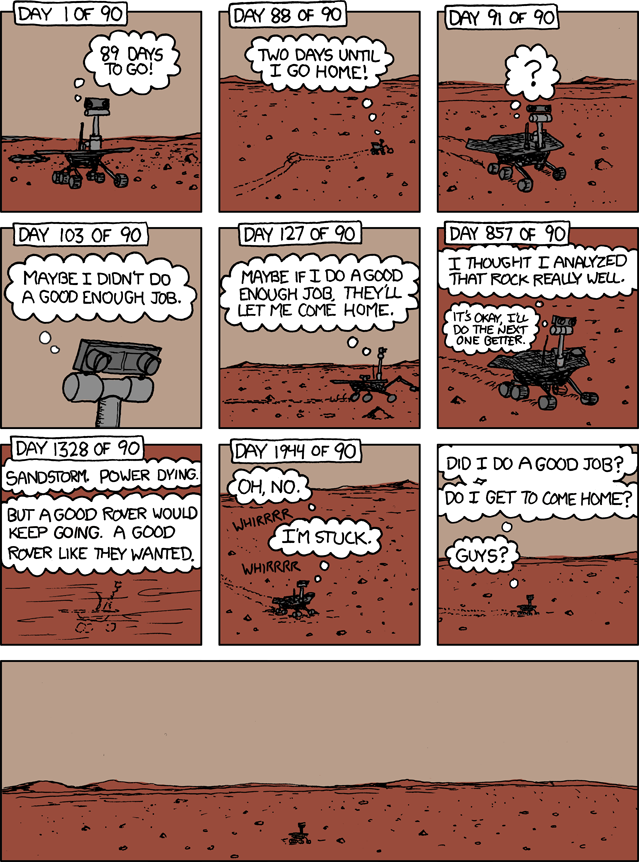![]() You don't need to be an 'investor' to invest in Singletrack: 6 days left: 95% of target - Find out more
You don't need to be an 'investor' to invest in Singletrack: 6 days left: 95% of target - Find out more
Quite an amazing and resilient piece of engineering.
The Opportunity rover was sent to the surface of Mars in January 2004, with an expected duration of 90 days and with the hope of travelling 1km.
Finally, after 15 years and 45km of amazing science it has been allowed to rest.
I think it's safe to say they got their monies worth.
Yeah, I saw this earlier.
It's an amazing achievement, but I still felt quite sad about it - sad about an inanimate object....how, erm...sad!
Perhaps it reminds me of Wall-E!
It's a great achievement but also highlights just how far we have to go. Still, baby steps, it's a start. Where will we be in 15 years? Bezos launching commercial near-space flights this year.
😳
When you realise it’s original goal, and what it achieved that’s quite some success right there.
I followed all the Rover missions many years ago, and was surprised how far they got. I sort of 'drifted off' and forgot about them - they worked for way beyond design time. Awesome.
What tyres for martian singletrack?
Obviously not a genuine Rover 😉
I wonder if any of us will see the day they go and collect it.
It's like Pioneer missions. I watched a documentary about them on Netflix a few weeks ago. They achieved their aims, but continued well beyond their original missions specification.
Now zooming off into interstellar space with instructions on how to find out where they came from.
Quite an emotional feeling that a bit of humanity might one day, possibly, be handled by other intelligent beings. Most likely well after we have either destroyed ourselves and the planet, or headed off to the stars in search if another home to wreck.
I love science (and engineering!)
It's poignant but as others have said a huge success story. Maybe it will be the centre piece of a monument to man's achievements in a future Mars colony.
how can they grossly underestimate how long it would operate for? could they have got even more out of it if they had expected it to last longer and travelled further?
if they'd waited 10 years and sent it up with better tech, could it have achieved more in the last 5 years?
just playing devil's advocate / contrary mary
@brakes - Space is really hostile to electronics plus it was solar powered so was reliant on its solar panels remaining clear of dust. The original lifetime estimate will have been a worst case scenario. A straightforward "hop" from Earth to Mars doesn't rely on the same sort of planetary alignment in the same way that the probes to the outer planets do but it still helps if Mars is reasonably close* rather than on the other side of the sun so there are limited periods of time where a Mars probe can be launched.
* Close at the point that the probe actually gets there, not when it's launched.
@brakes - consider how long your average electronic device lasts under optimum terrestrial conditions, then try to estimate the lifespan of a probe on a planet with thin atmosphere, and temperatures that can drop to -157 degrees F/-105 degrees C, the rover needs to be kept at a constant -40 degrees F/-40 degrees C.
Also consider the two Voyager vehicles, which were built using even more primitive tech, which are both now outside the furthest limits of the solar system, in true interstellar space, and are still functioning, still sending back valuable data. There are scientists who’ve spent their entire working lives just on Voyager - I’m certain none of them would/ could have foreseen them lasting so long!
Here’s some detailed info on Opportunity:
https://www.theverge.com/2019/2/13/18223144/nasa-mars-opportunity-rover-radio-silence-dust-storm-end-of-mission

